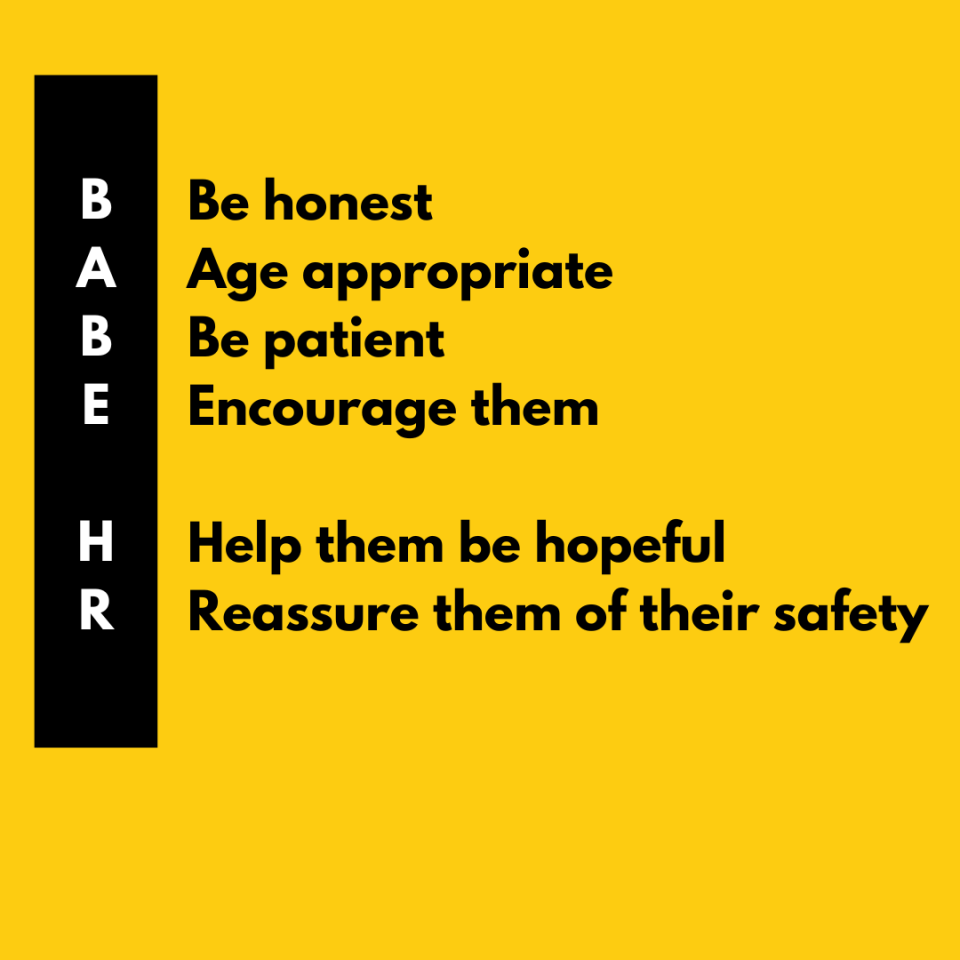Need help talking to your kids about Uniontown murder-suicide? Local experts offer tips
When a tragedy happens in the news or locally and hits closer to home, parents often aren’t sure how to talk to their kids about it.
The death of five people in Lake Township, including three Lake Local students, undoubtedly brought the conversation of death to the forefront in many homes over the weekend as students processed what they had heard at school or saw on social media.
Investigators say Jason Dunham, 46, Melissa Dunham, 42, and their children Renee, 15, Amber, 12, and Evan, 9, died in what appears to be a domestic dispute that became deadly. Authorities are investigating the deaths as a quadruple homicide-suicide. They have not disclosed who fired the fatal shots. No other people are believed to be involved.

Mental health counselor: Talk about death using BABE HR
Mental health therapist Rodney Long Jr. has come up with an acronym to help parents tackle the tough topic “because this stuff happens so often and parents are always asking.”
The acronym is BABE HR, which stands for:
Be honest
Age appropriate
Be patient
Encourage them
Help them be hopeful
Reassure them of their safety
Long said children need to be reassured of their safety, especially when a violent crime happens. But the discussion must be age appropriate.
“If you’re talking to a 5-year-old, you’re not going to give gory details. You say, ‘This bad thing happened.’ But if it’s a 15-year-old, you’re going to give some more specifics,” Long said.
“You want to let them know that a bad thing happened and it’s unlikely to happen here again and when it happens, we want to come together,” he said.

Long said he and other therapists counsel families to prepare for reactions — or lack of reactions — immediately and later from kids.
“The kids want to shut down because they don’t want to talk about it,” he said.
Some kids may also act out at school or in other settings after a trauma and a lot of parents aren’t equipped to deal with that, Long said.
Long said it is important to get kids to talk to somebody right away.
“It doesn’t have to be a counselor. It can be whoever they are close with. Just encourage them to talk about their feelings,” Long said.
How to talk with kids about domestic violence
The Ohio Domestic Violence Network said it has seen an increase in the number of children who were killed during an act of domestic violence.
According to its latest Ohio Domestic Violence Fatalities report, 22 children, including six babies, were killed between July 1, 2021 and June 30, 2022. Of the 72 domestic violence cases tracked, nearly a third of them involved both a homicide and a suicide. Children were at the scene of the violence in 35% of the cases, the report shows.
Long said he takes the same approach that he uses with kids about inappropriate touching to talk to them about signs of domestic violence at home.
“A kid might not think anything of it if dad is, say, hitting his mom because he’s seen that before and he’s scared, but he might think that’s what happens. Or if dad is ultra mean to mom, or vice versa,” Long said. “We try to talk to them when we go through these kinds of things about some of the signs. If mommy and daddy are yelling, sometimes there’s appropriate yelling and then there’s not appropriate yelling.
“Daddy yelling at the TV because he’s watching football is not the same as daddy yelling because he thinks mom messed up something,” Long said.
Advice from mental health experts: Need help talking to your kids about school shootings?
Akron Children’s expert also offers tips after scary news
In a video provided by Akron Children’s Hospital and on the hospital’s YouTube channel, Katrina Hermetet, director of the Division of Neurobehavioral Health and pediatric psychologist, shares tips for discussing traumatic events with children. The hospital also has a blog post about how to talk to your children when the news is scary.
“Research shows that children as young as 4 and 5 benefit from processing traumatic events with family members,” she said. “I think it’s really normal for families to try and protect kids from information, but the children are going to find out about it anyways, regardless of if we tell them or if they find out from a classmate or even overhear it on television.
Hermetet advises opening up the conversation and asking about the child’s feelings or thoughts. Try asking whether friends are talking about what happened and whether the child wants to talk to you about it.
After letting your child know it is safe to talk to you, let them know they are safe, let them know it’s going to get better and let them know you are always here for them.
“If you feel comfortable, you might want to talk about your own feelings and thoughts regarding the traumatic event,” she said.
Family annihilation cases on the rise in the U.S.
The Lake deaths appear to be part of a growing trend in the United States where a person kills at least two family members.
There have been at least 227 cases of family annihilation across the country since 2020, according to an analysis of media reports and data from the Gun Violence Archive conducted last month by the Indianapolis Star, part of the USA TODAY Network.
That's an average of one family annihilation every five days. They're often murder-suicides.
Stark County's last family murder-suicide occurred in 2021 when Jackson Township resident Nicholas Mavrakis III killed himself, his wife, Lesley, and their children, 13-year-old Ace and 5-year-old Pippa. Family and police suspect Mavrakis suffered from post-traumatic stress disorder stemming from his military service.
Michele R. Boone, director of clinical services at Stark County Mental Health and Addiction Recovery, said there are a variety of ways individuals and families can reduce and process their stress before tensions escalate to violence.
She said adults feeling overwhelmed need to remember that stressors will likely change with time and that they may need to take a break and regroup before responding from a place of stress. Children may express their stress in a variety of ways and may need help to express what they are feeling or what is bothering them.
"Taking time to talk when both adults and kids have had time to calm down from the stressor makes it easier to share what is going on and we can focus without our brains feeling so frazzled," she said.
She said it is important for everyone to take care of themselves so they are not as vulnerable and overwhelmed when stressors appear. Some ways that people can take care of themselves include getting enough sleep, connecting with support people, eating healthier, practicing mindfulness, such as using the Mindfulness Walk found at Petros Park in Perry Township, getting physical exercise and shifting their perspective about the stressor, Boone said.
Saying goodbye: Stark Parks offers 'wind phone' at Quail Hollow for grieving people
During back-to-school time, which families often cite as a stressful time, Boone advises the following to combat what may feel like a deluge of changes:
Spend quality time with each other, checking in about how things are going.
Follow a routine, which helps lessen stress in children.
Reserve a time to have family meals together every day for connection.
Encourage family members to do something that gets them moving, such as a walk or riding bikes.
Monitor schedules to make sure everyone has enough time to get a good night’s sleep and isn’t overwhelmed with too many extracurricular activities.
Give each other grace and kindness.
Look for signs that a family member may be struggling, such as trouble sleeping, unusual physical complaints like a stomachache, headaches, vomiting, changes in mood, or withdrawal from others.
Boone also advises calling 988 or 330-452-6000 if it appears that stress has affected a loved one's ability to go about their day normally and they are struggling with where to turn next, or when the family is not sure how to resolve a stressor safely.
Local counseling resources also can be found by visiting www.starkmhar.org.
Canton Repository staff writer Kelli Weir and USA Today writer Jeanine Santucci contributed to this article.
This article originally appeared on Akron Beacon Journal: Experts offer tips to talk to your kids about Uniontown murder-suicide

